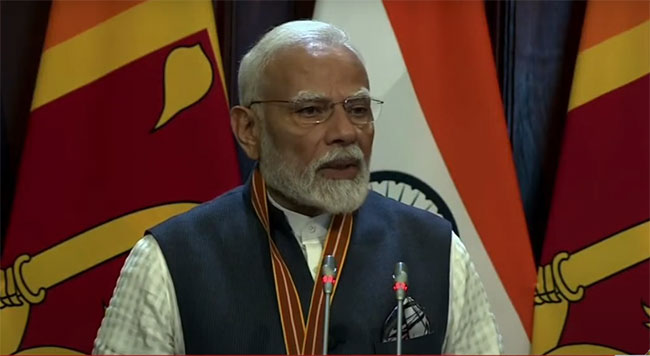Modi and Dissanayake discuss maritime, regional security and fishermen issue
April 5, 2025 02:02 pm
Indian Prime Minister Narendra Modi said the Sampur Solar Power Plant, Multi-product Pipeline, and Trincomalee Energy Hub will benefit all Sri Lankans, and that the interconnectivity agreement will enable Sri Lanka to export electricity.
Modi held a bilateral meeting with Sri Lankan President Anura Kumar Dissanayake on Saturday during his visit to Colombo.
The two sides signed seven Memorandums of Understanding after the bilateral talks including an ambitious defence cooperation pact. The two countries signed an MoU to develop Trincomalee as an energy hub. Another agreement was inked to facilitate New Delhi’s multi-sectoral grant assistance to Sri Lanka’s eastern region.
Issuing a joint statement following the meeting, PM Modi said he hoped the Sri Lankan government will fulfil the aspirations of Tamil people in the island country.
He also said that New Delhi expects the Colombo will “work in the direction of full implementation of the constitution, and fulfil their commitment of provisional council elections.”
During the joint statement, Modi noted that it was his fourth trip to the neighbouring nation and referred to President Dissanayake’s decision to choose India for his maiden foreign visit.
“This reflects the depth of our bilateral ties. Under our ‘Neighbourhood First’ policy and SAGAR vision, Sri Lanka holds a special place. In the past four months since President Dissanayake visited India, there has been remarkable progress in our cooperation,” Modi said.
The two leaders discussed regional security with Dissanayake reaffirming “Sri Lanka’s stand that it will not permit its territory to be used in any manner inimical to the security of India as well as towards regional stability.”
On the fishermen’s issue, the two leaders agreed on a humanitarian approach as PM Modi said, “We should release them quickly and give them the boats, we also discussed reconciliation...”
President Dissanayake said he sought PM Modi’s intervention to take measures to stop the practice and curb illegal, unreported, and unregulated (IUU) fishing...”
Modi, who was addressing the joint press brief with the Sri Lankan President Anura Kumara Dissanayake, also quoted Tamil saint Thiruvalluvar, saying, “What could be bigger protection against the enemy if not the shield of a true friend and his friendship? President Anura Kumara Dissanayake had chosen India for his first foreign visit. Today, I am his first foreign guest here in Sri Lanka. It shows the depths of our special relationship. Sri Lanka has a special place in our neighbourhood first policy and mission SAGAR.”
Modi spoke on India’s commitment to its ‘Neighbourhood First’ policy during high-level talks with Sri Lankan President Anura Kumara Dissanayake in Colombo. Addressing a joint press conference after the meeting on Saturday, Modi highlighted the deep ties between the two nations and stressed the need for Sri Lanka to address the aspirations of its Tamil population.
“The security interests of India and Sri Lanka are deeply intertwined. Our partnership is crucial for regional peace and prosperity,” PM Modi stated. He further said, “We hope that the Sri Lankan government will fulfil the aspirations of Tamil people.”
Modi noted that President Dissanayake’s first foreign visit was to India, and his own visit to Sri Lanka underscored the deep-rooted friendship between the two nations. “Under our ‘Neighbourhood First’ policy and Security and Growth for All in the Region (SAGAR) vision, Sri Lanka holds a special place. In the past four months since President Dissanayake’s visit to India, we have made remarkable progress in our cooperation,” he said.
India’s Neighbourhood First Policy, launched by PM Modi in 2014, is a diplomatic initiative that prioritises strengthening ties with its immediate neighbours in South Asia. The policy focuses on fostering regional cooperation, connectivity, and stability. The policy primarily focuses on Bangladesh, Bhutan, Nepal, Sri Lanka, Maldives, Myanmar, Afghanistan, and Pakistan.
(With Agencies Inputs)












